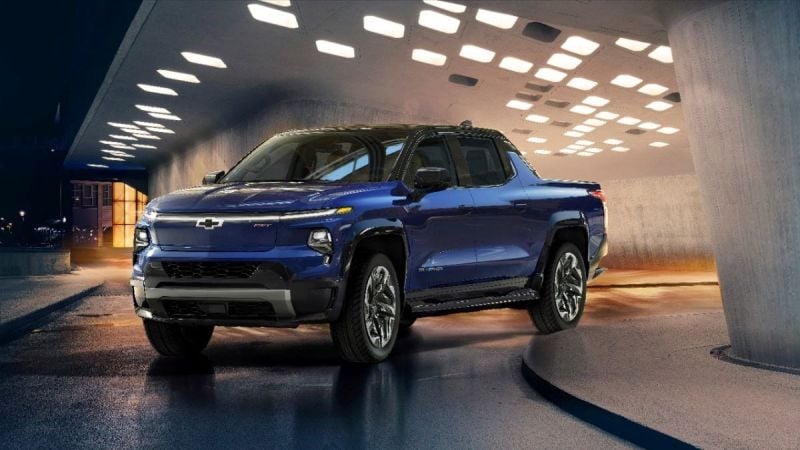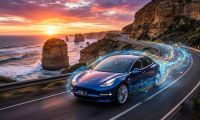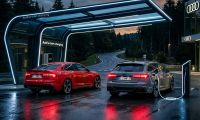The future of electric vehicles has reached a huge tipping point. Now, after years of wrangling and automakers trying to continually reinvent the wheel, seven automakers have agreed to work together on a charging network. This is huge news for anyone who is considering buying an electric vehicle. Many buyers have been on the fence because of concerns about the lack of a great charging network. With mass market vehicles like the 2024 Chevrolet Silverado EV due soon, this agreement removes the roadblocks to most charging problems. First stations are scheduled to open in the summer of 2024.
Rare Show of Unity
The seven major automakers involved in the new charging agreement released the same press release regarding the announcement. It outlines the plan.
“Seven major global automakers – BMW Group, General Motors, Honda, Hyundai, Kia, Mercedes-Benz Group, Stellantis NV – will create an unprecedented new charging network joint venture that will significantly expand access to high-powered charging in North America.
Targeting to install at least 30,000 high-powered charge points in urban and highway locations to ensure customers can charge whenever and wherever they need.”
GM CEO Mary Barra: “GM’s commitment to an all-electric future is focused not only on delivering EVs our customers love, but investing in charging and working across the industry to make it more accessible. The better experience people have, the faster EV adoption will grow.”
GM this week announced that it is relaunching its most popular EV, the Chevrolet Bolt, on its Ultium platform. It is also preparing to launch its 2024 Chevrolet Silverado EV, which is expected to be a big seller and really boost EV adoption.
Making EV Charging Easier Should Improve Adoption Rates
Most importantly, the charging stations will be accessible to all EV customers, offering both Combined Charging System (CCS) and North American Charging Standard (NACS) connectors.
I have often compared the charging connector fight to the old video recording battle of Beta versus VHS back in the 80s. VHS won out but Beta fans wasted a lot of money investing in the losing format. When GM agreed to use the Tesla format, it became clear that Tesla’s charging connector was going to be the most popular. It is important for the automakers to work together if they want EVs to succeed. The focus needs to be on making it easier for consumers if they want adoption rates to improve. The automakers address that in the joint statement.
“With a focus on delivering an elevated customer experience, the network will provide reliability, high-powered charging capability, digital integration, appealing locations, various amenities while charging, and use renewable energy.”
Charging Cooperation Long Overdue
According to the agreement, the first stations are expected to open in the United States in the summer of 2024 and in Canada at a later stage. Each site will be equipped with multiple high-powered DC chargers. The charging network is expected to be powered with renewable energy.
Too often, we hear nightmare stories about road trips ruined by the lack of charging stations. Drivers are forced to detour off highways to find working chargers at small town libraries or at retail centers like Walmart. Many drives report broken connectors or slow charge points. With the new network, convenience will be key.
“Focused on customer comfort and charging ease, the stations will be in convenient locations, offering canopies wherever possible and amenities such as restrooms, food service and retail operations either nearby or within the same complex.
Initial plans call for the deployment of charging stations in metropolitan areas and along major highways, including connecting corridors and vacation routes, aiming to offer a charging station wherever people may choose to live, work and travel.”
Removing Major EV Roadblocks
With U.S. electric vehicle sales expected to exceed 50% of total U.S. sales by 2030, the expansion of reliable charging infrastructure will become even more critical to widespread electric vehicle adoption.
Stellantis CEO Carlos Tavares: “We intend to exceed customer expectations by creating more opportunities for a seamless charging experience given the significant growth expected in the market. We believe that a charging network at scale is vital to protecting freedom of mobility for all, especially as we work to achieve our ambitious carbon neutrality plan. A strong charging network should be available for all - under the same conditions - and be built together with a win-win spirit. I want to thank each colleague involved, as it is a milestone example of our collective intelligence to listen and serve our customers.”
Chevrolet Photo
Mary Conway is a professional automotive journalist and has decades of experience specializing in automotive news analysis. She covered the Detroit Three for more than twenty years for the ABC affiliate, in Detroit. Her affection for the Motor City comes naturally. Her father ran a gas station while Mary was growing up, in Wisconsin.
Follow Mary Conway at @MaryConwayMedia and send her car news tips for future stories.
Set Torque News as Preferred Source on Google











